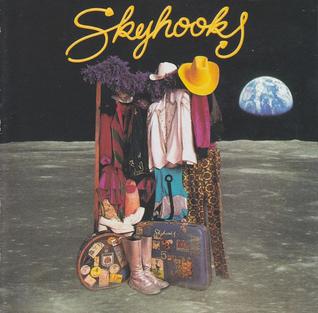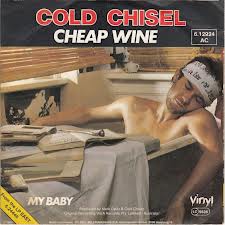Skyhooks were an Australian rock band formed in Melbourne in March 1973 by mainstays Greg Macainsh on bass guitar and backing vocals, and Imants "Freddie" Strauks on drums. They were soon joined by Bob "Bongo" Starkie on guitar and backing vocals, and Red Symons on guitar, vocals and keyboards; Graeme "Shirley" Strachan became lead vocalist in March 1974. Described as a glam rock band, because of flamboyant costumes and make-up, Skyhooks addressed issues including buying drugs in "Carlton ", sex and commitment in "Balwyn Calling", the gay scene in "Toorak Cowboy" and loss of girlfriends in "Somewhere in Sydney" by namechecking Australian locales. According to music historian, Ian McFarlane "[Skyhooks] made an enormous impact on Australian social life".
Graeme Ronald Strachan, professionally billed and known as "Shirley" Strachan or Shirl, was an Australian singer, songwriter, radio and television presenter, and carpenter. He was the lead singer of the rock group Skyhooks. While still a member of Skyhooks he had solo singles, which charted on the Kent Music Report, with a cover recording of Brenda Holloway's "Every Little Bit Hurts" and a remake of The Miracles "Tracks of My Tears". After leaving Skyhooks in July 1978 he concentrated on his solo career. He was the host of children's TV program Shirl's Neighbourhood (1979–83), From 1993 he appeared on home renovation TV program, Our House, as a carpenter and co-host. At the ARIA Music Awards of 1993, Skyhooks were inducted into the ARIA Hall of Fame. Strachan died in August 2001 in a self-piloted helicopter accident.
The Screaming Jets are an Australian hard rock band formed in Newcastle, Australia, in 1989 by frontman Dave Gleeson (vocals), Paul Woseen, Grant Walmsley (guitar), Richard Lara (guitar), and Brad Heaney (drums). The band has three albums that peaked in the top five on the Australian ARIA Charts: All for One (1991), Tear of Thought (1992), and The Screaming Jets (1995). Their 1991 single "Better" reached No. 4 on the related singles chart. Walmsley left in 2007 and formed his own band. In 2013, bassist Paul Woseen released an acoustic solo album, Bombido.

Cold Chisel is the self-titled debut album of Australian pub rock band Cold Chisel. Released in April 1978, it spent 23 weeks in the Australian charts, peaking at number 38.
Uncanny X-Men were an Australian pop rock band which formed in late 1980. Their founding mainstay was lead singer Brian Mannix. Originally with Nick Matandos on drums and Ron Thiessen on guitar, they were soon joined by Chuck Hargreaves on guitar and Steve Harrison on bass guitar. John Kirk replaced Harrison and Craig Waugh replaced Matandos by 1984. The band's debut album, 'Cos Life Hurts, peaked at No. 3 on the Australian Kent Music Report, and provided their highest-charting single "50 Years" which reached No. 4 on the related singles chart. Thiessen left to be eventually replaced by Brett Kingman. Their second album, What You Give is What You Get, reached No. 19, and included a top 20 single, "I Am" (April). The group disbanded in 1987 and have occasionally reunited to play live concerts. Mannix has had a solo career as a singer, TV personality and actor.

Living in the 70's is the debut album by Melbourne band Skyhooks. Released in October 1974 on the Mushroom Records label, the album achieved relatively little success until early 1975. It spent 16 weeks at the top of the Australian album charts from late February 1975, and became the highest-selling album by an Australian act in Australia until that time, with sales of over 200,000. In October 2010, it was listed at No. 9 in the book 100 Best Australian Albums. The album's eponymous track was ranked number 72 as part of Triple M's "Ozzest 100", the 'most Australian' songs of all time ranking.

Ego Is Not a Dirty Word is the second studio album released by Australian pop rock band, Skyhooks, in July 1975. The album was the follow-up to their highly successful debut album, Living in the 70's (1974).

Circus Animals is the fourth studio album by Australian band Cold Chisel, released on 8 March 1982. It was recorded and mixed at Paradise Studios and EMI Studios 301, Sydney. It reached number one on the Australian charts, remaining in the charts for 40 weeks, and also topped the New Zealand charts. The working title for the album was "Tunnel Cunts".
"My Baby" is a 1980 single from Australian rock band Cold Chisel, the third released from the album East and the first of the band's singles not to be written by pianist Don Walker. This was the only track credited solely to bass player Phil Small on any of the band's albums apart from "Notion For You" on the 1994 rarities album Teenage Love.

Guilty Until Proven Insane is the fourth studio album released by Skyhooks on 13 March 1978. It was the first album to feature Bob Spencer, who replaced guitarist Red Symons in early 1977. Spencer had played in Sydney rock band Finch and would later become a member of The Angels.

The Lost Album/The Collection is a double-disc album by Australian glam rock band Skyhooks, released in 1999.

Hot for the Orient is the fifth and final studio album from Australian glam rock band Skyhooks. This was the only album the band recorded without its second, and best-known, vocalist Graeme "Shirley" Strachan, who had been replaced with Tony Williams. The album peaked at number 64 on the Australian charts, and was the band's first studio album to fail to reach the Australian top ten. Skyhooks disbanded soon after but reformed in 1983 with the line-up which had recorded its first three albums, though it would not release new studio material until 1990.
Gregory John Macainsh is an Australian former musician and songwriter. He provided bass guitar and backing vocals for pop rockers, Skyhooks from 1973 to 1980 and subsequently for various reformations. According to Australian musicologist, Ian McFarlane, "Macainsh's biting, provocative songs were the perfect expression of adolescent obsessions and frustrations. With those songs, the band made an enormous impact on Australian social life." Macainsh became an intellectual property lawyer.

"Choirgirl" is a 1979 single by Australian rock band Cold Chisel. A ballad with an R&B influenced melody, the single was released months before the album East that it featured on. It was the first time the band had recorded with producer Mark Opitz. It peaked at number 14 in Australia

"Cheap Wine" is a 1980 single from Australian rock band Cold Chisel. The second single from the album East, the single was released in May, a month before the album. It reached number 8 on the Australian charts, the band's first top-ten single, and would eventually remain the band's second highest chart performance. It has been described as, "one of Don's finest commercial songs."

Live in the 80's is a live album by Australian rock band Skyhooks. It was released by Mushroom Records in November 1983 in Australia and was certified gold.

Hits'n'Riffs is a compilation album released in November 2015 by Australian band Skyhooks. It followed two weeks after the release of the band's 3CD box set, Don't You Believe What You've Seen or You've Heard

Live! Be in It is the first live album by Australian rock band Skyhooks. It was released by Mushroom Records on cassette and vinyl in December 1978 in Australia and on CD in 1991. The live recordings are taken from various concerts around Melbourne from December 1975 to July 1978.
"This Is My City" is a song by Australian band Skyhooks, released in July 1976 as the second single from the band's third studio album, Straight in a Gay Gay World. The song peaked at number 32 in Australia.
"Blue Jeans" is a song by Australian band Skyhooks, released in August 1976 as the third and final single from the band's third studio album, Straight in a Gay Gay World. The song peaked at number 12 in Australia and at number three in New Zealand.












